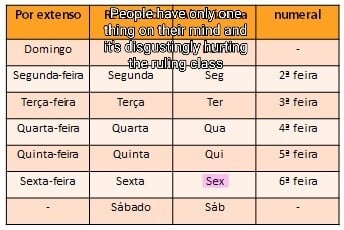this post was submitted on 18 Oct 2024
65 points (97.1% liked)
196
16476 readers
2219 users here now
Be sure to follow the rule before you head out.
Rule: You must post before you leave.
founded 1 year ago
MODERATORS
you are viewing a single comment's thread
view the rest of the comments
view the rest of the comments

Portuguese day names are the only ones that make sense.
Lots of other languages have days named after the sun, moon, and 5 planets or the gods associated with the planets. Obviously we have Sunday and Monday, or lunes in Spanish, but that's also why in Spanish, Mars = Marte, Tuesday = Martes. Probably most famously in English is Thursday coming from Thor's day (Þunras dag) with Thor being the equivalent to Zeus or Jupiter, which is where jueves comes from in Spanish. In Spanish though their sun-day got remained to God's day (domingo) and saturn-day to sabbath (sabado). Probably most interesting is that the connection even applies to Japanese. The days go in this order: 日月火水木金土 which means "sun moon fire water wood metal earth" which are the classical Chinese 5 elements connected to everything from the 60-year sexagisimal calendar to the bagua tao trigrams on the Republic of Korea flag. And if course, they're also the names of the planets with Mars being fire-planet, Mercury being water-planet, Jupiter being wood-planet, Venus being metal-planet, and Saturn being earth-planet.
So the planet Jupiter (etc.) is to some degree represented in the Thursdays (etc.) of three different languages. Not really saying that this makes more sense than Portuguese, but I think it's cool
I'm more confused why the British start counting week from Sunday.